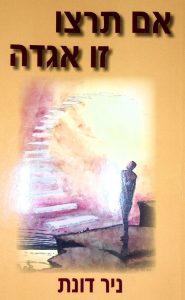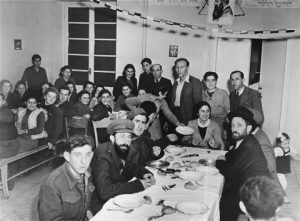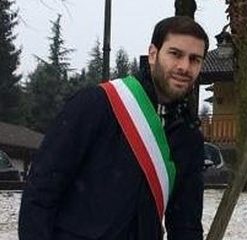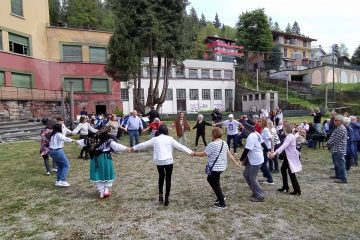Reuven Donath was a soldier of the Jewish Brigade and Eugenia Cohen was a young from Milan, who later took the Hebrew name of Noga. Both were instructors in Piazzatorre and then in Selvino, where they married and then together they went to Israel.
From the book “Im Tirtzu Zo Agada” (“This could be a fairy tale”), written by Nir Donath, son of Noga and Reuven Donath, members of the Sciesopoli home, which tells the story of his family from sec . XVI.
In this passage he speaks of Sciesopoli house and Selvino Children.
 “Excerpt from the book ‘Im Tirtzu Zo Agada’ (This Could be a Fairy-tale)
“Excerpt from the book ‘Im Tirtzu Zo Agada’ (This Could be a Fairy-tale)
by Nir Donath (son of Noga and Reuven Donath, team members in the Sciesopoli Villa)
Life in Selvino was a great and inspirational challenge to the team, and a gate to a better future to the children. They all struggled day in day out with situations they had not been used to. The team members, required to perform as educators without an adequate training but with a lot of good will, sensitivity and caring, on the one hand. And the kids, who until lately had been home-less, love-less and hope-less, and suddenly found themselves with abundance of all three, on the other hand… The transition was as sharp as a razor to all of them, and hard to contain to their great majority.
The rooms in the Sciesopoli Villa were large and spacious compared to the alcoves the children had known in their hiding places during the war – those who had known such alcoves; many of them had spent the last few years in the woods, without a shelter to protect them from nature’s hazards and the ruthless murderers who sought their lives. Their beds were clean and comfortable and reminded them – at least those of them who were old enough to remember details of their past – of beds in the homes they had come from. The food was delicious by any standard vis-à-vis the stale bread, the half cooked potatoes and the murky water called – wrongfully or maliciously – ‘soup,’ their main diet during their war for survival. Their cloths were new and intact, and even those that had not fitted them in size – some of them had come from donations – were better than the rags they were wrapped in when found by their saviours. Most important of all was the activity that had been initially imposed on the children against their will, and gradually turned into the heart of their lives. Morning formations, raising the Israeli flag to the top of the mast, training and competing in all sorts of sports, lessons in Hebrew, Mathematics and the Bible, walks outside the boundaries of the ‘camp,’ hours of artistic creation, assistance in the maintenance and the cleaning of the house, as well as group discussions in which team members told them stories of the promised land… Each of these served as a chapter in bringing the children back to life, and bringing life back to them.
Slowly their eyes stopped rushing around and fearfully looking over their shoulders, a habit that in the course of time had become their second nature. Slowly they started staring directly at their coaches and other team members rather than dropping their eyes while facing them – another habit that their fears had planted in their blood. Some of them grew muscles under their loose skins. Colour got back to their cheeks. The glazed and lifeless expression with which they had arrived at Selvino was little by little replaced by flickers of liveliness and joy. Zeiri and his team noted, with great satisfaction, signs of will in the children’s faces, that took over the place of despair. The will to live, belong, initiate and do things, and, in some of them, even the will to lead.
The efforts began to bear fruit. A light appeared at the end of the tunnel. It was feeling all that the mission would soon be over and that they would eventually return home…”
קטע מתוך הספר ‘אם תרצו זו אגדה‘
מאת ניר דונת (בנם של נוגה וראובן דונת, חברי צוות המדריכים בבית ‘שֶזוֹפּוֹלִי‘)
החיים בסֶלְבִינוֹ היו אתגר עצום ורב השראה למדריכים, ושער לעתיד טוב יותר לילדים. אלה גם אלה התמודדו מבוקר עד ערב עם מצבים שלא הורגלו בהם. המדריכים, כאנשי חינוך – ללא ההכשרה המתאימה אך עם המון רצון טוב, רגישות ואכפתיות – והילדים, כמי שעד לאחרונה היו חסרי בית, חסרי אהבה וחסרי תוחלת, ולפתע מצאו עצמם עם שפע מכל אלה. המעבר היה חד כתער לכולם, וקשה מלהכיל לרובם הלא מבוטל.
החדרים בְּבֵית ‘שֶזוֹפּוֹלִי‘ היו גדולים ומרווחים לעומת הכוכים שהילדים הכירו במחבואיהם בימי המלחמה – אלה מהם שהכירו כוכים; היו רבים שבשנים האחרונות התגוררו ביערות, ללא קורת גג וללא מחסה מפגעי הטבע ומהרוצחים האכזריים שביקשו נפשם. מיטותיהם היו נקיות ונוחות והזכירו, לפחות לבוגרים שזכרו פרטים מעברם הרחוק יותר, מיטות בבתים שמהם באו. האוכל היה נפלא בכל קנה מידה לעומת הלחם העבש, תפוחי האדמה המבושלים למחצה והמים העכורים שכונו בטעות או בזדון ‘מרק,’ שאליהם הורגלו במלחמתם להישרדות. בגדיהם היו חדשים ושלמים, וגם אלה שלא התאימו למידותיהם – והיו כאלה בין הבגדים שהגיעו מתרומות – היו טובים מבלויי הסחבות שלבשו כשאותרו על–ידי אנשי הבריגדה ונאספו אל מקום המבטחים. חשובה מכל הייתה הפעילות שבתחילה נכפתה על הילדים, ובהדרגה הפכה למרכז חייהם. מסדרי הבוקר, הנפת דגל ישראל לראש התורן, האימונים בענפי הספורט השונים, התחרויות שנערכו ביניהם, שיעורי העברית והחשבון והתנ“ך, הסיורים הרגליים מחוץ למתחם ‘המחנה,’ שעות היצירה, העזרה בתחזוקת הבית ובניקיונו, ושיחות החברה שבהן שמעו מחברי הצוות סיפורים מארץ ישראל… כל אחד מאלה היווה פרק בהשבתם של הילדים אל החיים, ובהשבת החיים אליהם.
אט–אט עיניהם חדלו מלהתרוצץ והם הפסיקו להציץ מעבר לכתפיהם בפחד, מנהג שדבק ברבים מהם והפך במרוצת הזמן לטבעם השני. אט–אט התחילו להישיר מבטם אל המדריכים ואנשי הצוות האחרים במקום להשפילו בעמדם מולם, עוד הרגל שפחדיהם טבעו בדמם. חלקם החלו להעלות שרירים מתחת לעורם המדולדל. הצבע חזר ללחייהם. המבע המזוגג והמת למחצה שאתו הגיעו אל המקום הלך ונעלם, ומקומו נתמלא – באטיות, אך בוודאות – בברק ובניצנים של שמחת חיים. זעירי וצוות מדריכיו ציינו לעצמם בסיפוק כי ראו רצון אצל הילדים, שהלך ותפס מקומו של הייאוש. רצון לחיות, להשתייך, לעשות, ליזום, ואצל מיעוטם גם להנהיג ולהוביל.
המאמץ שהושקע במקום על–ידי חברי הצוות החל להניב תוצאות. אור נראה בקצה המנהרה,
At pages 399-435 of the book you can read the history of the Donath-Cohen family.
These pages begin with the bombing of Haifa made by planes Italian fascists in 1939.
After this bombardment Donath decided to join the army English.
The pages can end with the departure of the copy from Selvino to reach Israel.
Among these pages there is narrated the story of Noga hiding to avoid being arrested by the fascists during the war, his arrival in Selvino, falling in love for Donat, etc.
From p. 412 to p. 435 there is the story of Selvino.
 Children of Selvino and their guests enjoy a festive meal in the house “The Youth Aliyah” in Selvino.
Children of Selvino and their guests enjoy a festive meal in the house “The Youth Aliyah” in Selvino.
Pictured are Noga Donat, Shlomo Weisbrod, Jeshayahu Flamholz, Isak Rechtman, Yaakov Meriash, Avraham Hassman, Helenka Saban, Lea Shnee, Miriam Weinstock, Yaffa Yanover, Edzia Winkler, Halina Liebeskind, Dora Rot, Yaakov Kopelman, Zvi Kaner, Zipora (Baranek) Friedman, Serka Fiederer.
Besides Moshe Zeiri, Teddy Beeri and Matilde Cassin, in the house before Piazzatorre and then Selvino, there were instructors Donath Reuven, Reuven Cohen-Raz, Eugenia Cohen, Dr. Pessia Kissin, Dr. Aharon Peretz, the dentist Karol.
Reuven Donath was a soldier of the company Zeiri Moshe, taught sports and Scouting. While still a teenager, in Tel Aviv had been an instructor of young explorers. He spoke good Italian, who had studied at the high school Balfour, and served as the company’s interpreter. When the company commander, Dov Chaimovitz, asked him to help organize the children’s camp in Piazzatorre, he accepted with enthusiasm. He’d had enough of inaction of the base, the useless wanderings through the city between soldiers of all nationalities, among the refugees or in clubs. (P. 22)
Eugenia Cohen, who later took the Hebrew name of Noga, was born in Milan. One year before the Liberation, when she was twenty-two years old, his brother was captured by the fascists in the street and he was deported to Bergen-Belsen, along with his parents arrested by the Germans. Fortunately both parents and his brother survived the camps and were released at the end of the war. She had managed to escape and hide in a village. When the war ended, he returned to Milan and went to the offices of the Jewish community, where he offered to help the refugees. From there she was sent to work for children in the area of Piazzatorre, where he met Reuven Donath and in Sceisopoli home in Selvino married him with a memorable party.
Moshe Zeiri was like a father, Dr. Pessina Kissin and Eugenia Cohen were like mothers.
Reuven Donat taught the boys games, doing exercises of “Young Explorers”, gymnastics, and take them for walks, outings and nocturnal explorations. They learned to sing Hebrew songs and heard the stories of the land of Israel. Every child, for the first time in many years, had a corner to himself. (P. 23)
The children were always afraid of running out of bread and this fear was difficult to erase. A Selvino many children would steal two or three sandwiches from the table or from the kitchen, They stuck them in his pockets and put them aside, just to feel safe. Eugenia Cohen, the administrator of the house, one day he found a whole deposit of stale bread and moldy under the mattress of a baby. (P. 34)
The atmosphere of the house was reflected in a series of humorous sketches posted on the magazine of Sciesopoli “Nivenu” (Our word) entitled “In a arun undser Hoiz” (In our house and its surroundings), written by Yaacov Hollander under the pseudonym of “Der Spiegel Krimmer” ( “the distorting mirror”). Hollander wrote in Polish, but was later translated into Yiddish. The series featured the house and its tenants as a “Jewish Republic” called “Sciesopoli”.
The President of the Republic was Moshe Zeiri, the Minister of War was Marshal Reuven Donat, the Minister of Finance Noga (Eugenia) Cohen, the Minister of Education the former prima ballerina Tzippora Hegger, and so on. There was also a “Parliament”. The economic problems had an important part in the life of the republic and was in force a strict rationing of bread under the personal supervision of “Marshal” Reuven. (P. 58)
One day he gave a big party in the Republic of Sciesopoli. With great joy and merriment was celebrated the marriage of the Minister of Reuven War and the Minister of Finance Noga. The entire population participated in the wedding celebrations, but an unfortunate incident cast a shadow on the event: during the dances and chants broke several dishes. It was immediately imposed on citizens collective punishment: for a whole week during meal was not served the salt. The Parliament, meeting in extraordinary session, decreed that the ceramic plates were replaced with aluminum plates, and as long as these new dishes have not arrived, would no longer celebrate the wedding in the Republic of Sciesopoli territory. (P. 59)
Reuven Donat, was in Palestine came about a year before the arrival of the ship eighteen boys “Katriel Yaffe”.
On the occasion of the birth of his first child wrote to the group that was interned in Cyprus:
“Every time I remember the time spent together, terribly feel your lack. Lack of you and the whole atmosphere in which we lived. Selvino!
That magical place in the mountains of northern Italy, our own place, a place for young Jews who were saved from hell, and returned again to life, creating their own image according to that of the land of Israel.
I want to tell of our first group, that of Chanita. Comrades!
Today I can look at them and say, despite all the efforts made, it was worth it. In no time this group, which was in Selvino only for a short time, has won not only affection and esteem, but also the first place in the village as a working team and youth group exemplary!
Continue to make you honor pioneers of Selvino! They can be many to follow the path marked by the first arrivals!
I would like to shake hands with each of you, hug you and wish you to have the strength and courage to overcome all obstacles that you will find on your way. In spite of those who try to stop us, we will succeed! Be brave!
And we will meet again soon in a free Jewish state! “(P. 131)
Quotes from the book by Aharon Megged: “The journey to the promised land”.
The intervention of Noga Donath at the ceremony of the twinning between Selvino and Zeelim, April 1, 2016.



